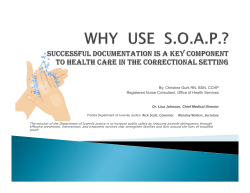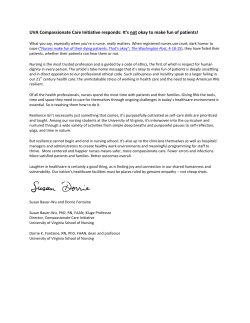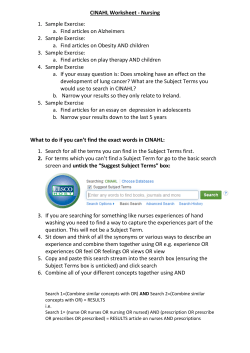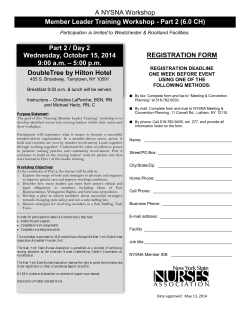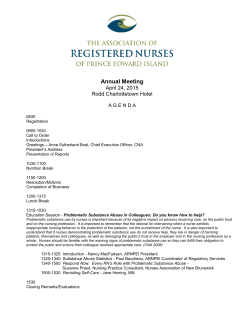
Inspection Report
Care and Social Services Inspectorate Wales Care Standards Act 2000 Inspection Report Marie Curie Cancer Care (Nursing Agency) Mamhilad House Block C Mamhilad Park Estate Pontypool NP4 0HZ Type of Inspection – Baseline Date(s) of inspection – Monday, 9 February 2015 Date of publication – Wednesday, 29 April 2015 Welsh Government © Crown copyright 2015. You may use and re-use the information featured in this publication (not including logos) free of charge in any format or medium, under the terms of the Open Government License. You can view the Open Government License, on the National Archives website or you can write to the Information Policy Team, The National Archives, Kew, London TW9 4DU, or email: psi@nationalarchives.gsi.gov.uk You must reproduce our material accurately and not use it in a misleading context. Page 1 Summary About the service The Marie Curie Cancer Care (Nursing Agency) is registered with the Care and Social Services Inspectorate Wales (CSSIW) to provide registered nurses to cancer and noncancer patients and their families with the aim of enabling people to be cared for and remain in their homes at the end of life. The provider is a charitable organisation and runs throughout Wales. The agency is commissioned by all seven Health Boards in Wales and the Velindre NHS trust to provide nursing through a variety of services. Individual assessments of people who use the service are undertaken by the board that commissions the services. There is a nominated person who represents the agency. The Registered Manager post is currently vacant but an application is pending with CSSIW. What type of inspection was carried out? We (CSSIW) visited the agency's office on an unannounced basis on the 9 February 2015 and on an announced basis on the 25 February 2015. An analysis of information held by CSSIW, about the service, led us to conduct a baseline inspection which considered the quality of staffing and leadership and management themes. To inform our report we considered the following: A review of information held by CSSIW about the service Care documentation of a person using the service Representatives of people using the service. Examination of two staff files. Information from the quality of care report 2013 to 2014. Information relating to POVA and complaints. Discussion with lead nurses from commissioning services. Discussion with a manager and staff. Discussion with representatives of the NHS What does the service do well? The agency runs additional services alongside providing nursing staff that is of benefit to both patients and their family representatives. These include the "helper service" which provides companionship, practical help and respite. Also the “caring for carers” that aims to support carers who are caring for those who are coming to the end of their lives. Marie Curie are currently running a pilot in Wales which offers bereavement support for families and carers of patients who have received care from the Marie Curie nursing service. Page 2 What has improved since the last inspection? There were no non-compliance notices issued at the last inspection and no areas for improvement identified. What needs to be done to improve the service? There were no non-compliance notices issued at this inspection. However, the service will improve with the implementation of the following: The service need to ensure that NHS district nurses are familiar with the process of communication so that they may have updated information from the agencies nurses. This is because a district nurse informed us that she was unable to obtain a next day update following an overnight shift by Marie Curie staff. The service need to ensure that all agency staff can contact the Referral Centre when they need to. This is because we were informed that it was sometimes difficult to be able to speak with the referral centre via the telephone when requiring urgent information. Page 3 Quality Of Life This theme is not considered in Nursing agency inspections. Page 4 Quality Of Staffing People can feel confident in the care that they receive because the service employs people following a robust recruitment procedure. This includes appropriate checks made and references sought in relation to staff skills abilities and qualifications. Their suitability in relation to the Disclosure and Barring Service (DBS) and a check made to the Nursing and Midwifery Council (NMC), where nurse’s current registration number is obtained. Staff files examined demonstrated that staff undertook an appropriate interview and that any gaps in employment history are robustly monitored and, if required, answers are sought. We saw evidence of ongoing reviews of DBS and NMC registration compliance. The service has a practice educator who is responsible for the induction and ongoing training of staff. We saw evidence of the induction staff undertake which includes a welcome to the charity, principles and practice of palliative care and Marie Curie Cancer Care guidelines. We saw evidence of the ongoing training programme which included a more in-depth training on palliative care, online training for the mandatory subjects and topics such as dementia care and challenging behaviour. We saw the overall training plan and monthly update reports from the practice educator detailing progress towards the plan. We spoke with staff who said they were able to undertake specialist training and one informed us that all she has to do is contact her manager should she require any specific training related to the people she cares for. People can be assured that staff are supported and motivated to provide the appropriate care. This is because the service will provide staff with supervision, and staff have a good level of contact with the agency and their line manager. We saw evidence in staff files of regular clinical supervision. This includes individual and group supervision. Clinical forum meetings are held monthly and staff are invited to attend. The staff members informed us that she receives regular supervision and that the Nurse Manager is always available to contact. She also said that should she have any issues during the course of her shifts then an on-call duty manager is also always available. Page 5 Quality Of Leadership and Management People that are working or linked to the service are clear about what it sets out to provide. This is because staff, people using the service and their representatives and those commissioning the services are involved in the planning, reviewing and quality assurance processes. The level of communication, in general, is robust and there is a good quality assurance process in place which ensures that the provider will respond positively to feedback and complaints. However, we were informed by a NHS district nurse that it was sometimes difficult getting updated information from agency staff following a night shift. We were informed by the Manager that there are processes in place and that all commissioners of services would be reminded of these lines of communication. The service needs to review the way the "referral contact centre" works as we were informed by a Marie Curie agency nurse that it was difficult to get through by telephone. Senior nurses and the Clinical Nurse Managers from the provider will attend monthly District Nurse meetings to discuss any issues that arise and, once a referral has been received, they will discuss the plan of care and the nature of the service required. All the information required by the agency nurses is normally at the service user's home. We saw evidence of one care file, where information included was person centred and included relevant risk assessments, levels of medication and service users’ (or family) preferences. Patient information is provided by the District Nursing Service for the relevant health board and any updates required identified by agency nurses is forwarded to the District Nursing Service by either the agency nurse visiting or the Marie Curie nurse managers. We were informed of and saw evidence of the agency's action plan for the development of services for 2014/15 and examined a report assessing the standards of practice with regards to record management. This evidences the commitment of the service to ongoing development based on a partnership agreement with local health boards. People can be assured that any complaints or incidents of safeguarding are promptly and robustly dealt with as we saw evidence of incidents relating to both. Patients and their representatives can be assured that whichever service staff are attending, they understand their role with regards to safeguarding people. We saw evidence of the latter where the provider’s staff prompted a safeguarding referral as a result of practice they had observed. We spoke with patients representatives, District Nursing staff and District Nursing managers who were all extremely complimentary of the service provided by the Marie Curie agency nurses. A patient's representative told us that the nurses are “wonderful and I'm always confident of leaving my relative with them”. Another told us that the nurses "are excellent timekeepers". Page 6 A manager from Continuing Healthcare for a local health board said that the "level of competency of staff is good and there is excellent communications with the agency". Page 7 Quality Of The Environment This theme is not considered in Nursing agency inspections. Page 8 How we inspect and report on services We conduct two types of inspection; baseline and focussed. Both consider the experience of people using services. Baseline inspections assess whether the registration of a service is justified and whether the conditions of registration are appropriate. For most services, we carry out these inspections every three years. Exceptions are registered child minders, out of school care, sessional care, crèches and open access provision, which are every four years. At these inspections we check whether the service has a clear, effective Statement of Purpose and whether the service delivers on the commitments set out in its Statement of Purpose. In assessing whether registration is justified inspectors check that the service can demonstrate a history of compliance with regulations. Focused inspections consider the experience of people using services and we will look at compliance with regulations when poor outcomes for people using services are identified. We carry out these inspections in between baseline inspections. Focussed inspections will always consider the quality of life of people using services and may look at other areas. Baseline and focused inspections may be scheduled or carried out in response to concerns. Inspectors use a variety of methods to gather information during inspections. These may include; Talking with people who use services and their representatives Talking to staff and the manager Looking at documentation Observation of staff interactions with people and of the environment Comments made within questionnaires returned from people who use services, staff and health and social care professionals We inspect and report our findings under ‘Quality Themes’. Those relevant to each type of service are referred to within our inspection reports. Further information about what we do can be found in our leaflet ‘Improving Care and Social Services in Wales’. You can download this from our website, Improving Care and Social Services in Wales or ask us to send you a copy by telephoning your local CSSIW regional office. Page 9 Page 10
© Copyright 2025






